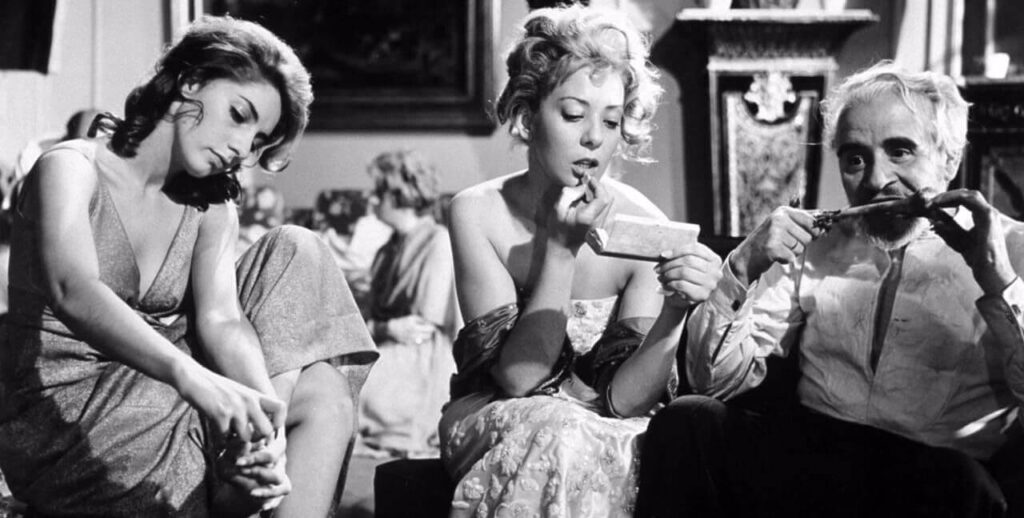It is not surprising that during these surreal times we live in, I find myself incredibly drawn to the work of Luis Buñuel, father of Surrealist cinema. Almost 60 years after it was originally released, his film “The Exterminating Angel” has never been more relevant. Buñuel’s understanding of human behavior is timeless, and we can all learn a thing or two when examining his work with the current pandemic in mind.
The film takes place in the lavish mansion of Señor Edmundo Nobile. He has invited friends over for a fancy dinner party. As the party is about to get started, the servants disappear one by one. They hastily flee from the house like they know something big is about to happen. After dinner, the guests retire to the salon to socialize. They decide to sleep over, and in the morning, they find themselves incapable of leaving the room even though the door is open. As the days go by, they run low on food, water and medicine, which strips them from everything that makes them civilized. Before you know it, reason and sanity take a back seat to panic and madness.
Buñuel intended the house to be an allegory for the conventions of high society, and his message was fairly straightforward. Stripped of these conventions, everything deteriorates, and human beings are reduced to animals. He even suggests in the iconic final frame, that we are all sheep following one another blindly. Not surprisingly, the film got banned in its initial release in fear of how people would react to it; it was deemed offensive and anti-government.
Much like COVID-19, an invisible force prevents the visitors from stepping outside the confines of the house. The title suggests that this is the work of an exterminating angel. I would never liken an infectious disease to an angel, but one can’t help but dwell on the eerie similarities of how this invisible force is affecting society as a whole. Like “The Exterminating Angel,” this outbreak feels like a wake-up call. Mother Nature is stepping in and exposing fragility of society and how easily the facade we’ve built around us can collapse.
Many have looked at this crisis as a test of our systems, and how years of social and economic progress can affect those farthest from wealth and power. In Buñuel’s film, the ones living on the margins of society are represented as the servants. They are exempted from this test and are given time to exit the house before entrapment. After all, the less privileged of the world are normally the victims of the situation that is forced upon them, and the whole point of the film is to switch roles and see how the elite would react to a desperate situation. The second people resort to an “every man for himself” mentality, chaos unfolds. In “The Exterminating Angel,” before all the chaos, dinner is served.
As the guests converse with one another at the dinner table, a servant walks in holding a big tray with a dish on it. He then falls to the ground and the food gets splattered all over the place. Suddenly the seated guests all break into laughter as the servant uncomfortably leaves the room. They laugh at the situation because they think it was a staged performance. One guest remarks, “Lucia has a flair for such chic surprises.” In other words, they are oblivious to the reality of the situation. Buñuel portrays those in power as delusional people with a rigid way of viewing the world. I couldn’t help but think of the powers that be, and how they are reacting to the current crisis we are in. At a time when social distancing to flatten the curve is most needed, some leaders are aiming for people to get back to work within weeks. They too are delusional to the reality of the situation.
In the following scene, Lucia catches one of the servants as they’re about to exit the mansion. “What is the meaning of this, Pablo? Are you leaving?” she says in a disappointed manner. “I must see my poor sister, madame,” he replies. “What’s wrong with your sister? Is she ill?” The servant then confirms the fact: “She felt unwell this morning.” And Lucia fires back with: “Ridiculous. This is an insult to my guests.” All she cares about is keeping the house running, even if it’s at the expense of someone else’s health and wellbeing.
Throughout the film we witness the people let go of social rules governing their behavior. It starts with them taking off their tuxedos to sleep on the floor, and escalates to sexual harassment, and people fighting each other for scarce resources. In the midst of a global pandemic that threatens our livelihood, people have reacted in similar fashion. Hoarding and stocking up on more than one needs has reached despicable levels. News reports claim that stores are running low on medicine, food, and medical supplies. Some are even taking advantage of the situation and selling them for ridiculous prices online. Reacting to a doomsday scenario selfishly without measuring our preparations can have dire consequences. Every crisis presents opportunity, and in the face of a common challenge, the world must work together as a global community.
Time spent in isolation should be time spent in reflection, and I could not help but wonder: What will happen after this global nightmare comes to an end, and millions of families exit their homes? Will we emerge from our homes as changed people with a new awareness of the world, or will we fall back into the same trap? The film suggests that the door is always open, and it is up to us to find the courage to walk through it.











